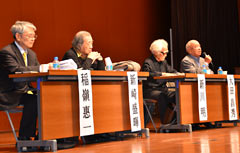Symposium to discuss the significance of Okinawa’s reversion to Japanese sovereignty held in Tokyo

On November 25, at Hosei University in Tokyo, (from right) Masahide Ota, Akira Arakawa, Moriteru Arasaki and Keiichi Inamine looked back through history on the occasion of the 40th anniversary of Okinawa’s reversion to Japanese sovereignty from U.S. rule.
November 26, 2012 Ryukyu Shimpo
On November 25, at Hosei University in Tokyo, a symposium was held to commemorate the 40th anniversary of Okinawa’s reversion from U.S. rule to Japanese sovereignty. Former governors of Okinawa, such as Masahide Ota and Keiichi Inamine, journalist Akira Arakawa, and former president of Okinawa
University Moriteru Arasaki participated in the symposium as panel members. Looking back over the history of Okinawa before and after the war, and the current situation of Okinawa as it marks the 40th anniversary of reversion to Japanese sovereignty, the panelists pointed out that the U.S. and Japanese governments are guilty of structural discrimination against Okinawa. They stressed the importance of securing the right to self-determination and asked what Okinawa’s reversion to Japanese sovereignty actually means.
Ota talked about the factors that prevent the problems surrounding the U.S. military bases in Okinawa from being resolved, saying, “These problems could be swiftly solved if lawmakers elected from other prefectures, who make up the vast majority of Diet members, were to see the issues that Okinawa has as their own. However, they do not. That’s why I said Okinawa is the object of structural discrimination.”
With regard to former Prime Minister Yukio Hatoyama’s pledge to relocate Futenma Air Station outside of Okinawa, Inamine said, “The people in the main islands of Japan and Okinawa criticized Hatoyama for not keeping his pledge.
However, the Okinawan people criticized him for failing after he had promised to relocate the base at least outside of the prefecture. I do not think it was wrong for Hatoyama to have put the issue of U.S. military bases in Okinawa, such as the relocation of Futenma, on the national agenda for discussion.” Furthermore, Inamine said that because of Hatoyama’s remarks, the majority of Okinawan people now demand the relocation of the base outside of Okinawa, and that trend will be difficult to reverse.
Arakawa, who opposed Okinawa’s reversion to Japanese sovereignty around 1972, pointed out that there is a limit to how Okinawa can assert autonomy against the central government, saying, “Okinawa would have to be independent in order to secure the 100 percent right to self-determination. The central government would eventually crush regional voices by exerting its judicial, administrative and legislative powers.”
Arasaki said, “The Japanese government uses its power to bring Okinawan people to terms, which leads to structural discrimination against the prefecture. That’s how the central government creates its dependency on the United States.” Arasaki explained that Okinawan people who support the Japan-U.S. Security Treaty are increasingly intolerant of discrimination against Okinawa, and are moving to cooperate with people who oppose the treaty.”
(English translation by T&CT, Mark Ealey)
Previous Article:Orion Breweries Ltd. to build solar panel facilities in Nago and Itoman
Next Article:Jin Air to offer Seoul-Naha service from 4900 yen
[Similar Articles]
- Editorial: We’ll exercise our right to self-determination
- [Editorial]Treaties show that Japan’s annexation of the Ryukyu Kingdom was an unjustified act
- Okinawa marks 40th anniversary of return to Japan Prime Minister pledges not to allow Futenma base to become a permanent fixture
- Okinawa reversion’s key negotiator meets Nago Mayor in Okinawa
- Okinawa poll reveals more than 74 percent oppose Henoko relocation, 70 percent consider base concentration “unjust”
 Webcam(Kokusai Street)
Webcam(Kokusai Street)


